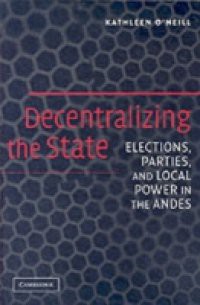This book, first published in 2005, explores the location and dynamics of power within the state, focusing on a recent wave of decentralizing reforms that have swept across both developed and developing countries in recent years. Variation in the timing of reform across countries only vaguely relates to the genesis of an international consensus pushed by big lenders and development banks or the reemergence of democracy in decentralizing countries. The book develops a theory linking decentralization's adoption to the electoral concerns of political parties: decentralization represents a desirable strategy for parties whose support at subnational levels appears more secure than their prospects in national elections. It examines this argument against experiences in Bolivia, Colombia, Ecuador, Peru and Venezuela and speculates on how recent political changes may affect decentralization's shape and extent in coming years.

